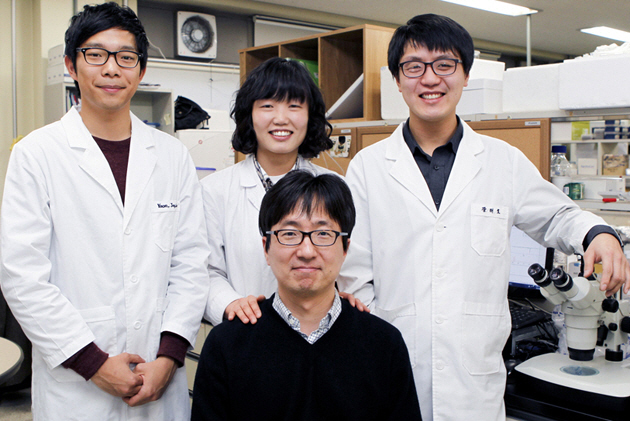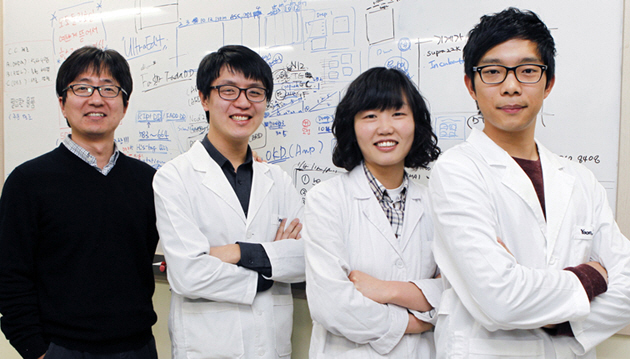Three students, an undergrad, masters and PhD student each publishes highest level thesis as a primary author
Research on mechanism of cell inflammation reaction that causes cancer, arteriosclerosis, diabetes, allergies, etc
First in the world to describe the 3 dimensional structure of core protein with inflammation reactions, construct related protein DB
[November 29, 2011]

Professor Park, Hyun-ho (sitting) and the lab members who are the primary authors of the SCI theses (from the back left, Yoon, Jong-hwan, Bae, Joo-young, and Jang, Tae-ho)
Professor Park, Hyun-ho’s lab in the School of Biotechnology hit a ‘jackpot’. Each of the three members of the lab, who are an undergraduate and graduate students working on their master’s and PhD simultaneously published their theses in three SCI journals that are the top in their respective fields as the primary author.
They are Yoon, Jong-hwan (23, a senior in the School of Biotechnology), Bae, Joo-young (27) a graduate school student working on his master’s and Jang, Tae-ho (28), who is in his PhD program. Under the guidance of Professor Park, Hyun-ho (37), they studied the mechanisms that caused inflammation reactions when combining proteins in cells. It has been reported that excessive inflammation reactions result in diseases such as various cancers, arteriosclerosis, diabetes, obesity, neurodegenerative diseases, irregularities in the immune system, and allergies.
After over two years of research with the support of the National Research Foundation of Korea and the Korea Health Industry Development Institute, Bae, Joo-young became the world first to define the three dimensional structure, which is called the ‘death domain’ for the inflammation reaction core protein (NALP3). His research was published in the November issue of the US 《Journal Of Biological Chemistry》 (IF 5.4), and Bae was listed as the primary author. The ‘death domain’ is a constituent of proteins related to cell death or inflammation reactions, and it is involved with the combination of proteins.
Based on this research, Jang, Tae-ho succeeded in designing and producing the peptide (amino acids) that retard the combination of the death domain and published his thesis as the primary author in the November issue of 《Biochemical Pharmacology》 (IF 4.9). Jang’s research result is judged to be an important platform that opened the doors to potentially developing new medicines that can suppress the occurrence of incurable diseases.
Based on the research of his upperclassmen, Yoon, Jong-hwan, an undergraduate, revealed all of the 100 or so death domains of proteins inside the human cell, and successfully made a database for the protein combined network using each of the death domains. Yoon also displayed great passion in reading, analyzing and summarizing over 300 related studies that were conducted as joint research effort by Park, Hyun-ho, Professor Jeon, Ju-hong of Seoul National University, and Professor Kwon, Dong-seob of Myongji University. In result, he placed his name as the primary author as an undergraduate student in the November issue of 《Nucleic Acids Research》, which is one of the world’s most prominent science journals and has the impact factor (IF) of 7.8. These results are also offered for researchers in fields related to the death domain with the website (www.deathdomain.org) as the information hub opened by Professor Park’s lab since November to the entire world for free.
In response to such achievements, Professor Park said, “I am even happier because these are achievements made by the founding members of the lab since being hired by Yeungnam University three years ago. Led by Tae-ho, who is working on his PhD and acting as the big brother, students with pure passion for academics began to care for each other like family and made a considerate atmosphere for the lab, and by helping each other out and having academic passion, such accomplishments were possible.” He also added, “It is very encouraging that student mentoring has become established as a tradition not only for our lab, but the entire School of Biotechnology.”
Professor Park, Hyun-ho, whose name was placed as a corresponding author while providing guidance for the series of research, acquired his PhD at Cornell University in the US in 2007, and worked on his post-doc at Stanford University in 2008. He was finally appointed as a professor at the Yeungnam University School of Biotechnology in September 2008. Professor Park already published his thesis that was the first to reveal the three dimensional structure of the death domain complex while he was a student in one of the world’s top three science journals 《Cell》(IF 32.4) and 《Annual Review of Immunology》(IF 49.2) as the primary author, gaining attention in his academic field. After taking a position as a professor at Yeungnam University, he published over 30 SCI papers showing his unparalleled capacities in research. He is recognized as one of the world’s best in research on proteins related to the death domain that places a decisive role in inflammation reactions and cell death reactions.

Undergrads publishing SCI theses becoming a tradition of the School of Biotechnology
Meanwhile, the Yeungnam University School of Biotechnology is showing great achievements such as publishing 16 theses written by undergraduate students in internationally renowned journals since 2009. In particular, 6 of the papers had primary authors from undergraduate students.
On this, Khang, Yong-ho (55), dean of the School of Biotechnology, said, “Three years ago, beginning with the lab of Professor Cho, Kyung-hyun, many SCI papers of which the main author were undergraduate students began to be made, and with these outstanding students enrolling in graduate school, they began teaching their juniors. In result, student-to-student mentoring naturally became established as a tradition. Our school also strengthened conditions for promoting professors and is striving to create an ideal professor that leads research. The school is also striving to cultivate a school custom by making it mandatory to operate a ‘journal club’ for reviewing the latest theses and making oral presentations on bio-related fields.” He added, I hope that this atmosphere spreads to the entire Yeungnam University, rather than stopping short here at the School of Biotechnology.”











